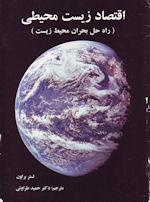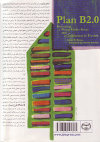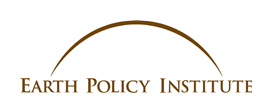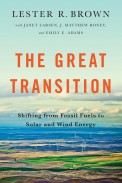Monday, September 26, 2011
During his career, Lester Brown’s books have been published in over 40 languages, a phenomenal achievement for any writer. French was one of the first, publishing the first two books he ever wrote: Man, Land and Food and Increasing World Food Output. Altogether, 7 of Lester’s books and 14 of the two book series he introduced and co-authored at Worldwatch, have been published in France. Soon an eighth book will be added to the list.
World on the Edge is being co-produced by Souffle Court and Rue de l'Echiquier publishing houses and will be available in early October when Lester will be in France to promote it.
Of the various publishers who have taken on the task of publishing Lester’s books in France, none have excelled the work of the current team. In 1996, Pierre-Yves Longaretti, co-director of the astrophysics institute in Grenoble, France, read Plan B 2.0 and answered its call to action by asking for the rights to translate the book and get it published in France. Eco-Economy had been published in France, but none of the other intervening books. Pierre-Yves’s friend, Philippe Vieille, who heads a biotech company, had recently founded a small publishing house, Souffle Court, which would be the publishing house.
Pierre-Yves not only translated the book—a huge task in itself—but he added footnotes relating the analysis to the situation in France. Philippe, meanwhile, teamed up with Calmann-Lévy, one of France’s premier publishing houses to co-publish the book. The editor told us that the translation was exceptional, a joy to read.
Philippe also was able to get Nicolas Hulot, a French media personality, to write a forward. In 2007, Hulot warned candidates in the French Presidential election that he would present himself as a candidate if ecology were not one of the main subjects of the election. Polls showed that his popularity was such that he would be a serious threat to the candidates. Thus, five of the 12 candidates, including Nicolas Sarkozy, signed his “Pacte Ecologique” (ecology pact).
In addition, Pierre-Yves and Philippe founded the nonprofit Alternative Planetaire to work on implementing Plan B in France. They have continued to translate much of our work, posting translations of our EPI Updates on their website. In addition, they have translated our Time for Plan B summary and the Plan B slide presentation.
Lester is looking forward to getting together with this tireless team. To see where Lester will be in France, go to our Events page.
Cheers!
Reah Janise Kauffman
Monday, September 12, 2011
 The announcement on Tuesday, August 30, that a coal-fired power plant on the Potomac River near Alexandria, Virginia, would soon be closed was another victory in the ongoing campaign by many environmentalists to move the world into the renewable energy era. This campaign includes making sure no new coal-fired power plants are built, existing plants are closed, and renewable energy is promoted.
The announcement on Tuesday, August 30, that a coal-fired power plant on the Potomac River near Alexandria, Virginia, would soon be closed was another victory in the ongoing campaign by many environmentalists to move the world into the renewable energy era. This campaign includes making sure no new coal-fired power plants are built, existing plants are closed, and renewable energy is promoted.
Coal is the world’s largest source of carbon emissions, destabilizing our climate and contributing to environmental pollution. In the United States alone 13,200 lives are lost each year due to air pollution from burning coal. If deaths from black lung disease among coal miners are included, the number climbs even higher. In addition, the health care costs to society of burning coal are currently estimated at more than $100 billion per year, roughly $300 for every person in the United States or $1,200 for a family of four. These costs are real, but it is the American people, not the coal companies, who shoulder the burden.
The efforts to stabilize climate will be won or lost with coal. Fortunately, several environmental groups are leading the charge against coal: the Sierra Club, Friends of the Earth, Greenpeace, Rainforest Action Network, and Earthjustice.
The Sierra Club’s Beyond Coal Campaign has successfully stopped over 150 coal plants in the United States from being built. They are now working to keep new coal plants from being built and to shut down existing coal-fired power plants. Already 71 plants are scheduled for total or partial closure, most of them by 2016.
Friends of the Earth has a number of campaigns around the world. They are working to protect communities from toxic coal ash, end mountain top removal, get the World Bank to stop funding coal projects, put existing mining protections into action, eliminate dirty coal subsidies, halt the development of liquid coal, and expose false solutions like carbon capture and sequestration.
Greenpeace USA has now taken a step further with its Quit Coal campaign. Organizing its vast community of activists into an online network, it has focused community efforts to shut down coal plants in the United States. In doing so, Greenpeace has made it easier for people to reach out and organize in their own communities to make the change that is necessary to cut carbon emissions in the world’s leading industrial economy.
Rainforest Action Network (RAN) is going after the banking sector to get them to cut financing of new and existing coal plants and to fund clean energy projects such as wind and solar. In August 2010, RAN announced that several leading U.S. investment banks, including Bank of America and J.P. Morgan, had ceased lending to companies involved in mountaintop removal coal mining.
Earthjustice provides vital legal representation, often free, to environmental groups to “even the odds against powerful special interests and to hold accountable those who jeopardize the health of the planet.” It works to preserve our natural heritage, to promote clean energy, and to safeguard our health.
The fossil fuel industry, however, is not going down easily. They are pumping billions of dollars into their own campaigns to discredit the science of climate change and to lobby Congress to eliminate pollution laws and controls.
Pushing back against this tide is New York City Mayor Michael Bloomberg, who on July 21, announced that he was contributing $50 million to the Sierra Club’s Beyond Coal Campaign. This action by Bloomberg, one of the most successful business entrepreneurs of his generation, demonstrates a strong commitment to providing a healthy future for everyone.
Here are some links if you would like more information on what we’ve written on closing coal plants.
- U.S. Moving Toward Ban on New Coal-Fired Power Plants
- The Beginning of the End for Coal: A Long Year in the Life of the U.S. Coal Industry
- A Fifty Million Dollar Tipping Point?
- Chapter 8: Building an Energy Efficient Economy, from World on the Edge
Coal is not the only energy source being protested in the United States. The newly US State Department-endorsed Keystone XL pipeline created a strong wave of protests in Washington, DC in August spearheaded by 350.org and the Tar Sand Action Group. Over 1,200 people were arrested during this protest, notably James Hansen, Bill McKibben, and Phil Radford from the environmental community, as well as Daryl Hannah, an actress who is known to speak out on environmental issues. The Dalai Lama and other notables have also joined in opposition to this project.
It is up to each of us to become involved in these efforts to close coal-fired power plants and to help the United States become a world leader in stabilizing climate.
Sincerely,
Reah Janise Kauffman
Tuesday, September 06, 2011
There are few things more exciting than to receive an email or letter from an individual who is so energized by our books that they want to translate one into their language. Over the past several weeks, we’ve been approached by people who want to translate and publish World on the Edge in Croatian, Czech, Greek, Malayalam, and Marathi.
One can never tell what that kind of enthusiasm will generate, but looking at one of our longtime publishing arrangements might provide a clue.
In 1990, Hamid Taravati, a medical doctor in Iran came across a copy of State of the World 1989 in a bookshop in Tehran, in which Lester Brown had a chapter. Hamid had found practicing medicine alone to be unsatisfying, especially when compared with the problems his country was facing. He wanted to do something to help solve them. Thus he decided to start translating books that might provide help. He had translated two before he came across State of the World. He found the analysis and issues so impressive that he started translating it the same day. From that day on he and his wife Farzaneh Bahar, also a doctor, have devoted their lives to increasing environmental literacy in Iran, mostly through translating Lester’s books.
Hamid and Farzaneh have translated and published all of EPI’s books, all of which generate great interest. For example, Eco-Economy was selected for an award by the Peka Institute (formed by several leading Iranian publishers) as the best nonfiction book published in Iran in 2003. The four reasons given for selecting Eco-Economy were its clear and concise presentation of the global environmental problems facing humanity and solutions for them, the credibility and global influence of the author, the excellence of the translation, and the noteworthy efforts of Hamid in increasing environmental literacy in Iran. In addition, the Iranian Ministry of Environment distributed copies of Eco-Economy to the 1,000 representatives of Iran’s environmental NGOs. The Minister called it a “monumental work.”
In addition, the Iranian Ministry of Environment distributed copies of Eco-Economy to the 1,000 representatives of Iran’s environmental NGOs. The Minister called it a “monumental work.”
The Deputy Minister of Natural Resources distributed 500 copies of Outgrowing the Earth throughout the Ministry and to NGOs. An engineering company purchased 600 copies and distributed it to its clients, and a well-respected physician purchased 100 copies for dissemination.
Hamid and Farzaneh eventually created an environmental NGO which works more on the local level offering workshops to promote various Plan B goals and environmental literacy in general. They also have a website devoted to the work of the NGO and the books. It also has a special section that contains translations of our Plan B Updates. Hamid also regularly publishes excerpts from the books and Updates in Iran’s leading newspapers and magazines.
Hamid regularly tells us about professors, policymakers, and others who have purchased dozens of copies of the books and how excited they are about the information. The irony in this situation is clear: the United States and Iran do not have diplomatic relations, but the relationship between us at EPI and Hamid and Farzaneh could not be closer. As a result of their work, we are now one of the principal sources of information on global environmental issues in Iran.
Cheers,
Reah Janise Kauffman
P.S. Click here for our list of translations.
Page 1 of 1 pages


